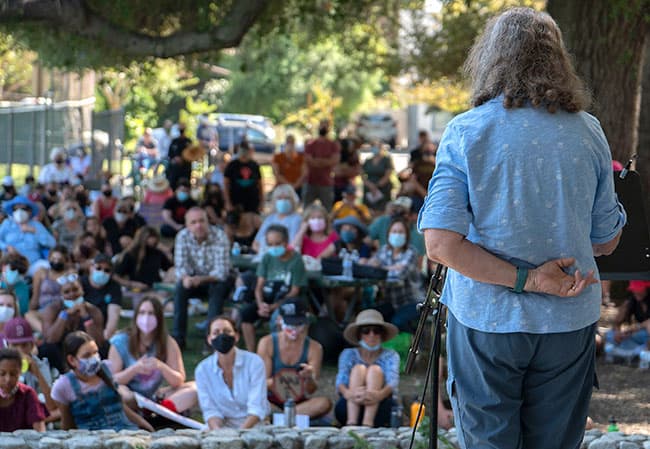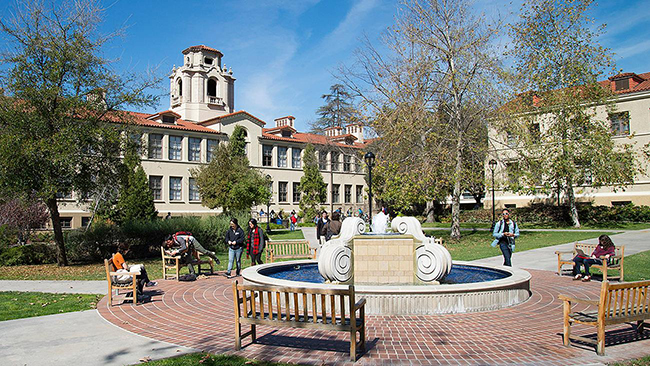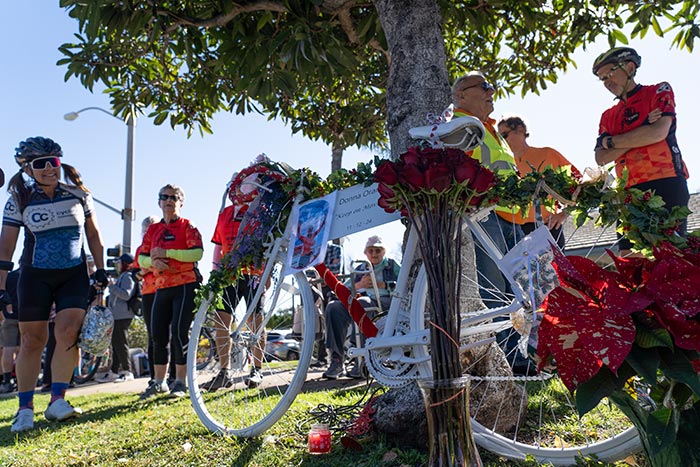Updated: Claremonters rally for ‘Women’s March Action’

by Andrew Alonzo | aalonzo@claremont-courier.com
During the first weekend of October, thousands of citizens across the country, including over 150 in Claremont, marched to raise awareness about the currently threats to women’s reproductive rights — specifically the new Texas abortion law which took effect in September.
With no exceptions for rape or incest, the new law in Texas prohibits abortions for women “after detection of an unborn child’s heartbeat” (which can be as early as the sixth week of pregnancy). The law also deputizes private citizens, allowing them to report and to sue those who violate S.B. Number 8.
“It’s important for us to stand up and speak out against the … audacity of the regressive policies some of these states are trying to enact, not only with women’s rights but voting rights. It’s all connected so … we got to stand up, make some noise and be heard and let our elected officials know that, if they’re going to fight for this, we’ve got their back,” Boos said.
On Sunday, residents showed up early for the 1 p.m. march to raise their voices and signs, which disparaged the Texas law. Among them was Ontario resident Erika Hernandez and Claremont resident Dr. Lori Dick, who received honks from drivers passing by.
Holding signs that read, “Ruth sent us!! Not your business!” and “Pro choice is my choice!” the two women shared that they were marching for all their “sisters,” all women of the past, present and future.
“Everybody, it’s for people past, it’s for my daughters, my granddaughters … because if we don’t it now, they’re going to do the same thing 40 years later. It’s like, you can’t take away a right you’ve already given us. And it does not apply across the board, it’s not men and women, it’s just women. And so, I’m a woman and therefore I’m going to fight it [injustice],” Hernandez said. “We’re all going to stand together as one.”
“Some cities in California have more resources than others. And there’s more women, say on the east side or in the middle of the city who don’t have resources to act on what they need. So, we need to be a voice because someone has to hear it,” Dr. Dick shared.

Women’s rights activists of all ages gather at the intersection of Indian Hill and Foothill boulevards on Sunday for the beginning of the Claremont Women’s March Action. The protestors then marched four blocks south to Memorial Park where the event continued with speakers and music. Throughout the first weekend of October, citizens across the country, including over 150 in Claremont, walked in solidarity to raise awareness about the issues currently threatening women’s reproductive rights — specifically the new Texas abortion law. The message of “it’s my body, therefore it’s my choice to have an abortion and to make health related decisions,” echoed among the protestors and speakers. Full story coming soon. COURIER photo/Andrew Alonzo.
Both Dr. Dick and Hernandez said that after this and other rallies, they hope to see an America where people essentially put their money where their mouth is and go out to vote.
Not long after the pair arrival, the crowd at intersection began to increase, with more protesters arriving and drivers blaring their horns in support. Soon, all four corners of the Route 66 intersection were filled with 150 activists, many wearing purple and holding custom signs pleading for the government to stay out of women’s reproductive rights and healthcare.
Before making the four-block march from the intersection to Memorial Park, Dr. Dick shared the necessity of people understanding the gravity of what’s at stake for women now that the new Texas abortion law is a reality.
“When you have a law that says you can’t make your own choices, that’s inexcusable. That’s totally not in the reference of democracy and in our country, we need to make ways. We need to make ways for women to have the life that they need to have. Getting pregnant is not just a one-person job and it’s not one person who’s going to raise that child so making these choices makes all the difference whether kids get support, families have enough food, whether they can support themselves. This is a way of women making important choices so they can actually support their children,” Dr. Dick explained.
At about 1:15 p.m., Claremont Women’s March Action volunteers Claudia Strauss and Karen May ushered the crowd south toward Memorial Park, beginning the march. Along the route, May used her megaphone to energize the crowd with supportive chants.
“Women’s rights are under attack! What do we do?” she asked the marching activists.
“Stand up, fight back!” they responded.
Once at Memorial Park, the protesters were greeted with musical entertainment by Ellen Harper, Jen Rosen and special guests who sang empowering songs.
Here are more views from the speakers at the march in their own words.
- Jennifer Stark, the mayor of Claremont, who said she wanted to “unpack” the moral inconsistency between a woman’s right to choose and general COVID vaccine compliance, “and to center these two issues: the right to choose, and COVID compliance, around the fact that we are profoundly and inextricably connected to one another through our relationships.”
- Rose Ash, former president of the Pomona Valley Chapter of ACLU of Southern California, gave a personal anecdote about her mother, Tessie, who was in need of reproductive services after miscarrying but was denied at the local hospital because the doctor refused to treat her. One year after that incident, her mother gave birth to Ash’s brother, Saul; ten years later, Tessie gave birth to Rose. On Sunday, Tessie’s great granddaughter, Tessa, sat in the audience listening to her grandmother speak. “[Tessie’s] story is a reminder to all of us that the struggle continues, that the struggle really never ends. This is a reminder to remember those in Texas today whose lives are in jeopardy,” Ash said.
- Rachel Forrester-Ambrosio, president of the League of Women Voters of Mt. Baldy Area, thanked everyone for coming and explained how women’s rights are still under attack. “In the last decade, 479 laws restricting abortion were passed in spite of public pushback. A majority of Americans, 59%, and that includes 59% of moderate Republicans, believe that there should be little to no restrictions on a person’s right to an abortion,” she said. “If abortion was on the ballot, abortion would win!” she said before the crowd began cheering. “And [Republican lawmakers] know it.”
- Reverend Jessie Smith, rector of Saint Ambrose Episcopal Church and president of Claremont Interfaith Council, briefly apologized to the activists there for some of the twisted biblical rhetoric parishioners have used against reproductive activists in the past. She then chastised restrictive healthcare laws. “This is not biblical, this does not reflect the faith that I represent,” she said. “At the heart of the argument against women’s reproductive services, is the issue of defining where life begins and where it ends, which is not spelled out for us in science … [nor] in any religious scripture.”
- Beverly Speak, a Girl Scout Leader, read answers from questions she asked some of her seventh-grade girl scouts. Questions included what they want current world leaders to know about women’s rights and choices; the information they need, and how will they use it; and, what they hope will happen now so they can reach their full potential. “They want to hold us adults accountable for making their desired futures possible,” Speak said.
- Reverend Dr. Jen Strickland, pastor at Claremont United Church of Christ, spent time thanking the many supporters at Memorial Park and for their spirited fight for women’s reproductive rights. “Thank you for dreaming with me of a just society in which we offer women spiritual support and comfort as they make their on reproductive choices,” she said.
- Dionne Bensonsmith, Ph.D., a visiting assistant professor at Claremont McKenna College and Black women’s reproductive health expert, shared a personal story about her mother and grandmother who both “inherited the tight spaces created by racism, sexism and white supremacy in movement and transformed these spaces making room for people like myself to come and speak to you today.” She also said to “all of these women, and all Black, Indigenous, Asian, Latinx women; to fems, to queer, to trans-people of color, thank you for your seen and unseen labor on which we all depend.”
- Atalie Oliva, a Planned Parenthood patient speaker, also gave a personal anecdote about the life changing opportunity that planned parenthood was able to offer her before, during and after her services. “I found solace in those who helped me at Planned Parenthood. I now find myself connected with all those who are in Texas, where can find themselves in the same position as I was … only they would have one week to make a life altering decision,” she said. “I wish for them, and for women around the world, to have the same access to resources and support as I did … Everyone should have the freedom and power to control their own body, decisions, and lives.”
- Amanda Hollis-Brusky, author, Supreme Court expert and chair of the politics department at Pomona College, educated the crowd on the parallels between the constitutional crisis of 1937 and today, and shared how activists can use their voices to make change. “There’s two lesson I want you to take away … the first lesson: keep the pressure on the Supreme Court, … let’s let those justices know we’re paying attention. Here’s the second lesson I want you to take away: there’s nothing constitutionally mandated or natural about the number nine. For the first 100 years of our history as a republic, congress routinely exercised its constitutionally granted powers to change the number of justices. Congress has this tool … and I want to take this opportunity to implore Congresswoman Chu and her democratic colleagues to dust it off and use it,” she said.
- Congresswoman Judy Chu, U.S. Representative for California’s 27th congressional district and the author of the Women’s Health Protection Act of 2021, thanked the supporters who marched throughout the weekend and also shared that her bill is the first pro-abortion vote to reach the house in over 25 years. “With this strong vote, we took the first step to ensure equal access to abortion, for every woman, everywhere … Finally women’s voices are being heard.” Congresswoman Chu’s bill, which is cosponsored by 215 U.S. representatives, passed the House on September 24. On September 29, the bill was read a second time by the Senate and was “placed on Senate Legislative Calendar under General Orders. Calendar No. 139.”
- Congresswoman Norma Torres, U.S. Representative for California’s 35th congressional district, began her remarks by thanking Bensonsmith and said, “it is so important to ensure that everyone is seen and everyone is heard.” Congresswoman Torres then looked out into the crowd and ask all of the women present, “who is the master of your body? Your temple?” The resounding force from the response of “ME!” was both heard and felt. Before concluding, Congresswoman Torres spoke about why some fight against women’s reproductive rights. “What’s it all about? Control … it is about denying women liberty and justice for them, for us. And the nastier that they get, the nastier that I will get,” she said.
- Andrea Moreno, a media representative for Los Angeles County Supervisor Hilda Solis, said that Solis was there with them in spirit, marching and fighting for the same cause. “With Texas and Mississippi [laws], we cannot afford to be tired. I think some of you know the long trajectory that Supervisor Solis has here in the San Gabriel Valley and there are many other women that we are following in their footsteps, and they have been fighting a very long trajectory and so we have to continue fighting. Some of us are newer to this game, but I want to say that it keeps us going,” she said.
“If we don’t do it [fight], then it’s a huge step backwards, you know this is a battle against centuries of patriarchy. As a father of two daughters, I understand how important this is … and they need to be in places where its easier to get women’s reproductive services than it is to get guns. I just think that … if we wait it’s going to be too late and we have to stand up and fight now — otherwise we’ll be less effective,” Boos said.
Sunday’s Claremont Women’s March Action was sponsored by Move Forward Claremont Inland Valley, the city of Claremont and the Democratic Club of Claremont.










0 Comments